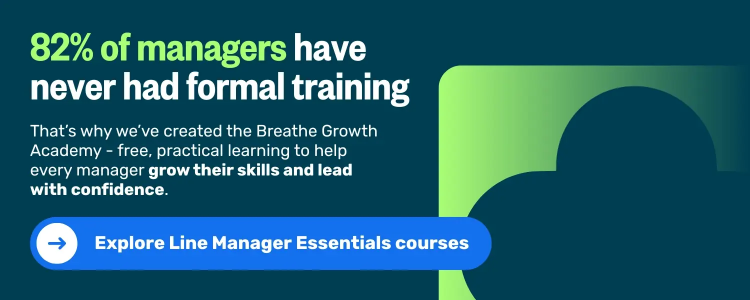6. Improve existing skills
When it comes to self-improvement, we often focus on learning new skills. But strengthening what you're already good at can be just as powerful. This might mean enhancing technical skills or soft skills you already possess. And the impact on the business could be bigger than you expect.
But, how do you assess your current skills?
Before you can grow, it helps to know where you're starting from. Taking stock of your skill set shows you what you're doing well and where there's room for improvement.
Here are a few ways to begin:
-
Try a self-assessment
There are free tools out there to help you reflect on your strengths and identify skills gaps. These offer a useful starting point for building a professional development plan.
-
Ask for feedback
A fresh perspective can be helpful. Whether it's from your line manager, peers or team, feedback can highlight areas to develop or strengths you might not have noticed.
-
Look back at recent experiences
Reflecting on recent projects or challenges can help uncover what helped you succeed - and what you could work on next.
This kind of reflection makes it easier to shape a career development plan with clear, achievable goals.
An example of a powerful skill that's worth developing in the workplace is emotional intelligence. When thinking about learning and development, emotional intelligence is one of the most impactful skills to build - whether you're an employee, a manager or a business leader.
Understanding emotional intelligence
Emotional intelligence is your ability to recognise your own emotions and understand how others might be feeling as well. It's a key part of any personal development strategy or plan. It shapes how we communicate, make decisions and handle challenges at work and in our personal life.
By building emotional intelligence, managers and business leaders find it easier to give and receive feedback and support teams effectively. Like any skill, it can be developed with time, reflection and practice.
7. Have a positive mindset
Embrace failures as learning experiences. Adopting a growth mindset, as described by psychologist and famous author, Carol Dweck, can help you tackle challenges and grow with confidence. Believing you can develop certain skills over time is key to meaningful development.
8. Learn from failure
Everyone makes mistakes. What matters is how we reflect on them, identify skills gaps and use them to improve future performance. A missed target or unsuccessful project might be disappointing but it can still provide valuable insights
9. Hone your expertise
It's sometimes best to study one thing in more detail than to try and learn lots of things at a more superficial level. Focus your personal development plan on a single skill set if needed - giving yourself time to fully develop that area through focused training sessions or targeted development programmes.
10. Prioritise your personal development
Learning and development matters - even when things feel busy. It can be easy to cancel time set aside for training and development when your workload ramps up. But making space for employee training or development opportunities is an investment in your confidence, growth and long-term success.
11. Measure your achievements
Tracking your progress helps you stay on course. Review your goals, learning objectives and development needs regularly. If something isn't working, reflect, adapt and use that insight to move forward.
12. Explore quick and free training and development opportunities
If you’re short on time or budget, free online training and development opportunities can be a great way to build skills without a big commitment. Webinars, tutorials and micro-courses - like those on the Breathe Growth Academy - can help you learn quickly, without needing to block out days for intensive training.
Digital tools and bite-sized training content are especially helpful for ongoing learning, as they’re easy to fit around your day-to-day work.
The Breathe Growth Academy is our free online learning hub, packed with short, expert-led courses and practical resources. Our Line Manager Essentials training is ideal for anyone looking to develop their people management skills and grow their career with confidence.
Or if you’re looking to implement more structured, formal learning within your SME, take a look at Breathe Learn. You’ll get flexible, self-paced training content and courses designed for busy teams - built right into the same HR system where you manage employee records, performance and more.
Want extra support? Finding a mentor has many benefits
Having a mentor can be a valuable part of your learning and development. They bring experience, encouragement and an outside perspective - helping you build confidence and keep moving forward.
Here's what a great mentor can offer:
Guidance based on experience
A mentor can help you navigate challenges, spot potential skills gaps, identify training needs and make more confident decisions. They can also support with specific learning and development goals by sharing what's worked for them.
A fresh point of view
It's easy to get stuck in your own way of thinking. A mentor offers an outside lens, helping you see things differently and explore new learning experiences and development opportunities.
Support when things feel tough
Training and development takes time - and motivation can dip when your workload is heavy. A mentor can help you stay focused, track your progress and keep your objectives in sight.
Career insight
If you're considering your next step, a mentor can help you create a career development plan. They may also connect you with others, share practical advice, or suggest learning paths that build towards your goals.
Finding the right mentor
Start by thinking about who you admire – someone whose approach, values or experience you respect. That might be a colleague, a former manager or someone in your wider network. Then start a conversation. Most people are open to share their knowledge - especially if you're clear about what you'd like to learn.
It's time to get started: here's a free career development template for your SME
You've now got the tips to start building your personal development at work - now it's time to put them into action. Step one? Set clear goals and record them.
Luckily, we've created a free career development template to help get you started. Use it to map out learning and development goals, identify development needs and spot learning opportunities.
Feel free to download and make it your own.
Professional development doesn't just benefit you - it shapes the success of your team, too. Whether you're working on your own goals or helping others grow, the right support makes all the difference.
Breathe makes it easy to manage performance and learning in one place. Track employee training, monitor progress, set learning objectives and build clear career development plans - all in one place. It's everything you need to make learning and development a natural part of everyday work. Start your free 14-day trial today.
And remember, if you're looking for free, expert-led training that's short, practical and easy to apply, the Breathe Growth Academy has you covered. Our Line Manager Essentials courses are a great starting point for any line manager looking to build confidence and develop key skills.







